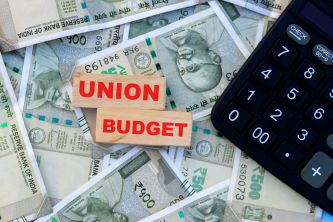What Is a Surplus Budget

When a government’s revenue is more than its expenditure, it’s called a Surplus Budget. A Surplus Budget occurs when the government prepares its annual plan in a manner that its expenses don’t exceed its revenue. In such a scenario, it is able to keep its spending on wages, infrastructure creation, defence, healthcare, pension, interest payments, subsidies within the revenue it is going to earn through taxes, duties, monetization of assets, interest and so on.
Budget Surplus Example
The formula for a budget surplus is S = T – G – TR, where
S = Government savings =
T = Tax revenue = Rs. 20,000 crore
G = Government spending on goods and services = Rs. 15,000
TR = Transfer payments = Rs. 2000 crore
Thus, by the above formula and the figures in the example,
S = Rs. 20,000 crore – Rs. 15,000 – Rs. 2,000 crore = Rs. 3,000 crore
Countries like Ireland, Germany, Switzerland, and South Korea usually post budget surpluses. Kuwait posted a budget surplus in 2022-23, thanks to high oil prices in the year. Saudi Arabia posted a budget surplus in 2022, again due to high oil prices. In the last couple of years, Brazil has also posted monthly budget surpluses, owing to booming exports of commodities, mainly agricultural.
How a Budget Surplus Impacts the Economy
A budget surplus is a good thing and reflects sound fiscal management by the government. A budget surplus means the government has resources to spend on infrastructure creation and its welfare plans without having the need to borrow or borrow less. Since the government’s borrowing needs are not there or less, it allows the private sector to raise funds at low interest rates. This keeps cost of their operations low and enhances their profitability. It also enables greater investments in R&D, education, healthcare, infrastructure creation and a robust business ecosystem.
Risks of a Surplus Budget
The risk of a surplus budget is that government can get too narrowly focused on ensuring a surplus. This may lead to them compromising on investments in R&D, education, healthcare and infrastructure. It can also lead to higher taxes as revenue generated from economic activities may not be enough for investments in job-creating activities. As a result, government may find it easier to hike taxes and milk the existing base of taxpayers.
Advantage of Surplus Budget
A surplus budget ensures fiscal discipline on the part of the government. It helps them to focus on projects and schemes that are most important for the growth of the economy. When a government does not borrow, it leaves space for private sector to borrow at low interest rates. It also prevents unhealthy competition between political parties to resort to populist schemes and borrow excessively to fund their pet projects. This leads to a fair and equitable society that lives in peace, while laying emphasis on innovation, competence and fairness.
Disadvantages of Surplus Budget
A government that is obsessed with a surplus budget may focus too much on fiscal discipline. At times, this can lead to lack of investments in R&D, innovation and infrastructure. This can have long-term damage on the country’s economy as technological advancements need research and innovation to flourish. It can also keep such countries behind those who are investing heavily in R&D, even if that means taking on large debt.
It can also lead to harassment of common citizens if the tax officials are given strict targets to chase collections. It can then have an adverse impact where citizens look for loopholes to hide their earnings to show lower incomes and hence pay less tax.
Over time, due to lack of investments in existing and new infrastructure, it can lead to inadequate job creation and poor roads, ports and other infrastructure, that in turn hurts the country’s trade and economy. Lack of jobs also results in lower tax collections, showing that a surplus budget can also put into motion a vicious cycle that’s difficult to come out of.
Is a Budget Surplus a Good Thing?
A budget surplus is an outcome of good fiscal management and hence, it’s mostly a good thing. It reflects an efficient economy where tax compliance is high and politicians are not indulging in populist schemes. This ensures that there are few distortions in the economy and everybody is doing their duty. It means politicians are not resorting to gimmicks and understand their responsibility. It also leads to a fair and just society.
How do you calculate a budget surplus
A budget surplus is calculated by subtracting all the expenditure of the government including interest payments and outward remittances from its revenue that includes taxes, dividends from companies, fee from services, interest from loans and inward remittances.
Conclusion
A budget surplus is a good thing but economic management needs flexibility as the environment evolves. What is good at one point of time may not be as good in another time zone. It is thus important that a government keeps good advisors and responds to evolving situations. It may not be a bad idea to run a little deficit if it is directed at infrastructure building, job creation and other useful and productive economic activities. To what extent and how far that deficit should go is what will differentiate between good and bad economic management.
Disclaimer: ICICI Securities Ltd. (I-Sec). Registered office of I-Sec is at ICICI Securities Ltd. - ICICI Venture House, Appasaheb Marathe Marg, Prabhadevi, Mumbai - 400 025, India, Tel No : 022 - 6807 7100. I-Sec is a Member of National Stock Exchange of India Ltd (Member Code :07730), BSE Ltd (Member Code :103) and Member of Multi Commodity Exchange of India Ltd. (Member Code: 56250) and having SEBI registration no. INZ000183631. Name of the Compliance officer (broking): Ms. Mamta Shetty, Contact number: 022-40701022, E-mail address: complianceofficer@icicisecurities.com. Investments in securities markets are subject to market risks, read all the related documents carefully before investing. The contents herein above shall not be considered as an invitation or persuasion to trade or invest. I-Sec and affiliates accept no liabilities for any loss or damage of any kind arising out of any actions taken in reliance thereon. The contents herein above are solely for informational purpose and may not be used or considered as an offer document or solicitation of offer to buy or sell or subscribe for securities or other financial instruments or any other product. Investors should consult their financial advisers whether the product is suitable for them before taking any decision. The contents herein mentioned are solely for informational and educational purpose.
Please Enter Email
Thank you.
Related content

Articles - Personal Finance
What is PM Gati Shakti Yojana
Hon'ble Finance Minister Nirmala Sitharaman unveiled three major economic railway corridors in the interim budget of 2024 for the PM Gati Shakti Yojana. Explore detailed information about PM Gati Shakti Yojana.

Articles - Personal Finance
Analysis of Interim Budget 2024
Get to knwo about the impact of interim budget 2024 and a detailed analysis in this article.

Articles - Personal Finance
What is a Budget Deficit
Find out the importance of budget deficit. Cause of budget deficit and What is the relationship between budget deficit and stock markets

Articles - Personal Finance
Union Budget 2024 – Trivia Part 2
The Union budget 2024 presentation is just around the corner. Let us look at some trivia regarding the Union budgets from the past

Articles - Personal Finance
What is Union Budget and Why it so Important
Learn about the what is the Union Budget in this article for a comprehensive information of its importance.

Articles - Personal Finance
Union Budget: Key Details & Importance
As we come closer to February 1, the chatter around the expectations over Union Budget increases. From young college students looking to start their careers and small business owners to leading economists and industrialists, almost every Indian citizen keeps a tab on the Budget announcement. Let us discuss what is Union Budget and its importance for the economy.

Articles - Personal Finance
Impact of the Budget 2024 on Share Markets
The Union Budget 2024 got quite a cheer from the share market as major indices ended on a positive note. The NIFTY 50 and the Sensex benchmark indices gained during the Budget speech and finished green.

Articles - Personal Finance
What to Expect From Budget 2022 for Individuals and Salaried People
Over the last two years, individuals, especially salaried people, have taken quite a hit because of the pandemic. Work from home has not only increased expenses such as electricity and WiFi bills but has also put a strain on take-home salary. Naturally, people hope that the government will step in and ease some of these troubles through their Union Budget announcements.

Articles - Personal Finance
What is the impact of the Union Budget on the Indian Stock Markets
Indian stock markets are dynamic prone to ups and downs depending on a host of factors. Every year, one major event that impacts the equities and bond markets is the announcement of the Union Budget.

Articles - Personal Finance
History of the Union Budget in India
The ritual of presenting the Indian Budget is more than two centuries old, dating back to colonial times. India's first-ever Budget was presented by James Wilson in 1860, a Scottish economist and politician.

Articles - Personal Finance
10 Taxes Affected by Budget
Taxes are the most crucial and most significant source of revenue for the Government. The Government uses the revenues generated from taxes to provide basic facilities to its citizens and the nation's overall development. For example, construction of roads, buildings, infrastructure, public healthcare facilities, providing various subsidies, etc.

Articles - Personal Finance
What is Populist Budget
A budget typically meant to please people is known as a populist budget. It spends more on lucrative schemes that can increase the Government's fiscal deficit. Such a budget doesn't have any enduring positive impact on the country's economy.

Articles - Personal Finance
What are the Components of Union Budget
The Union Budget of India has two main components, each with two sub-components. To know more in detail, visit the link.

Articles - Personal Finance
Types of Budget in India
Deep dive into the three different types of government budgets and their impact on the economy.

Articles - Stocks
What is the Budget? Union Budget for Beginners
The Finance Minister of India presents the Union Budget on the first day of February every year. It is also known as the annual financial statement of the country. It contains the details of the revenue sources and expenses undertaken by the Government during the applicable financial year.

 Top Mutual Funds
Top Mutual Funds







COMMENT (0)